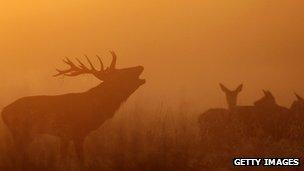Scottish Natural Heritage study highlights deer cull concerns
- Published

People surveyed were most concerned about the plight of deer
People are more worried about the plight of deer than extinction-threatened wildcats, according to a survey on Scottish wildlife.
People who responded to the Scottish Natural Heritage-commissioned research put deer top of the list of animals they were most concerned about in conservation terms.
Wildcats were fifth after red squirrels, golden eagles and grouse.
Deer were the animal most people associated with Scotland.
Researchers said people were worried about deer because they were shot, hunted and culled.
The researchers noted that managing public communications surrounding the issue of culling remained a "significant challenge" for SNH.
The public agency has been trying to control deer numbers for several years.
The Scottish Nature Omnibus Survey is carried out on a regular basis. The latest results suggest there has been a steady level of concern about deer since September 2011.
However, worries about wildcats have declined over the same period.
The researchers said: "The very fact that deer are shot/culled at all clearly remains a concern for many, but the communications challenge would appear to be greatest in dealing with the manner in which this is done, with the concept of being 'hunted' being a particular concern."
Genetic test
Conservationists have become increasingly concerned about the state of Scotland's wildcat population.
In September last year, a team put together by the Scottish Wildcat Association (SWA) reviewed 2,000 records of camera trap sightings, eyewitness reports and also road kills.
SWA said the analysis suggested there could be 35 pure wildcats - far fewer than previously thought.
Last month, a scientist who has developed a genetic test to identify pure Scottish wildcats warned that the species could be extinct within two years.
Dr Paul O'Donoghue said cross-breeding with feral and hybrid cats made extinction a certainty unless "urgent" conservation activity took place.
The University of Chester biologist said pure wildcats should be trapped and placed in conservation zones.
- Published21 May 2013
- Published13 September 2012
- Published22 February 2012
- Published23 November 2011